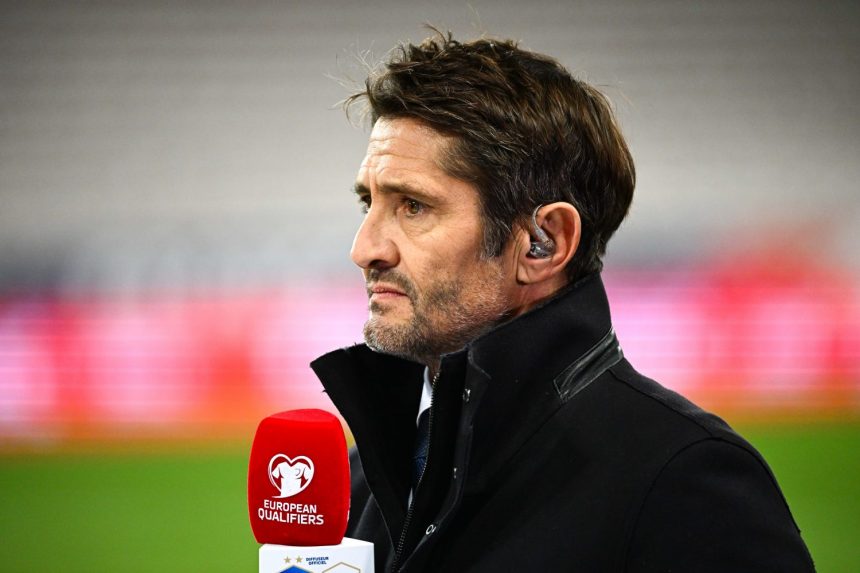Bixente Lizarazu, former left-back for the French national team (1998 World Cup and 2000 European Championship winner) and for Bayern Munich (as well as Olympique de Marseille), joined via L’Equipe the media battle between Paris Saint-Germain and the French national team on Friday evening, following the injury to Ousmane Dembélé (28-year-old forward) during the match against Ukraine. According to him, PSG has no right to complain and should primarily focus on self-reflection, not to mention the absurdly packed schedule.
“There is no reason to take any particular risks with Dembélé”
“Paris is putting a lot of pressure on the French national team, and I don’t think that’s fair or respectful towards Didier Deschamps. His experience as a player and a coach is far greater than anyone else’s. There is no reason to take any particular risks with Dembélé, and if he played him, it’s because the player felt he was ready and that Deschamps thought it was okay.
Questioning Deschamps’ professionalism is quite deplorable. Accusing him of negligence is also. From experience, I know that you can’t control everything about an injury, whether you’re coming back from an injury or even when you’re in top form and can get injured at any time. On the other hand, I can understand that PSG is frustrated by the injuries to Dembélé and Désiré Doué, but they should be more frustrated by the schedule, by this Club World Cup at the end of an already exhausting season.”
Lizarazu: “It was PSG who started him in the Super Cup”
Dembélé has suffered several injuries since June. This is a trend that should raise concerns overall for a player who has been used extensively and who has certainly pushed himself too hard in the euphoria of a fantastic season. However, it was indeed PSG who started him in the Super Cup, after three weeks of vacation and only one week of training. One could also question whether it’s dangerous to resume training so quickly, so abruptly. Just because Paris had a fantastic season in terms of physical management doesn’t mean they’ll have the same success this year.
(…) All the players are affected by this completely crazy, abnormal season. They are vulnerable, which requires even more intelligent management. (…) We are also seeing a battle of egos, with everyone thinking they know better than the others, and dialogue will be necessary for things to return to normal.”
There’s a valid point here, emphasized by all players, coaches, media, and fans: the schedule is becoming “dangerous” for the players. Injuries are already part of the sport, but the risk is increased by such an intense pace. Players in the biggest clubs and national teams hardly have any real recovery time. Even during their short breaks, they have to maintain their fitness to be ready to play again immediately. This requires the coaching staff to be careful, to manage workload and playing time.
As Lizarazu says, PSG was particularly strong, and perhaps a little lucky, last season. It will be difficult to repeat that performance this year, with a shortened pre-season. In fact, the club could have appreciated some “help” from the French national team, with a bit of caution. Dembélé started against Tottenham, but the entire PSG team had just returned from their break, and it was impossible to rotate the squad with a fresher player. The players also needed to get back into rhythm by accumulating some playing time. He was also on the bench against Nantes in the second matchday, coming on for 30 minutes.
At that time, he had suffered a minor muscle injury the previous weekend and had only been able to participate in one full training session. If Dembélé had been in top form, he would undoubtedly have started. Bringing him on as a substitute, why not? But from halftime onwards, it certainly looked like a risky move. Injuries can always happen, but it’s also possible to minimize the risk. That wasn’t the case here, and it’s PSG who will ultimately pay the price. The national team can probably digest this situation more easily. They simply need to acknowledge that they could have been more cautious and stop acting as if PSG is to blame for everything.
But Lizarazu concludes quite rightly: “There needs to be some dialogue.” Snide comments from pundits will get nowhere, whether they’re directed at PSG or the French Football Federation (FFF). What’s needed above all is mutual support and open communication. This applies to football in general, particularly regarding the match schedule.
